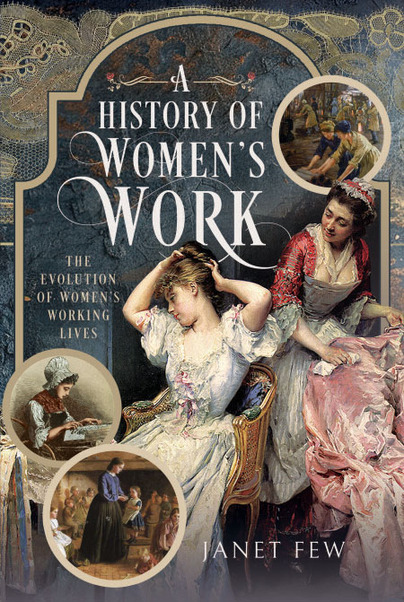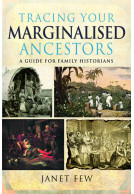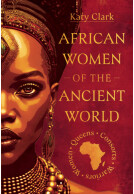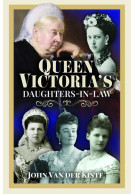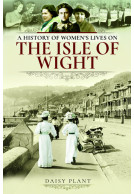A History of Women's Work (Hardback)
The Evolution of Women's Working Lives
Imprint: Pen & Sword History
Pages: 176
Illustrations: 12 mono illustrations
ISBN: 9781036105266
Published: 12th May 2025
(click here for international delivery rates)
Order within the next 1 hour, 21 minutes to get your order processed the next working day!
Need a currency converter? Check XE.com for live rates
| Other formats available | Price |
|---|---|
| A History of Women's Work eBook (4.7 MB) Add to Basket | £14.99 |
A History of Women's Work explores the often overlooked contributions of women throughout history, particularly in a patriarchal society where men have dominated the historical record. While men were more likely to leave traces – through wills, leases, and civic duties – women laboured behind the scenes, performing crucial yet unpaid tasks for their families and communities. In many households, women supported their husbands’ work, ran home-based industries, or sought paid employment despite societal restrictions.
This book delves into three main areas of women’s work: household tasks, home industries, and paid employment outside the home. Through case studies and practical research tips, it sheds light on the lives of these women, encouraging readers to uncover their own female ancestors' stories and contribute to a richer understanding of women’s history.
As the author explains at the beginning of the book, this is not designed to be an in depth look at the history of women's work, but rather a starting point for people who are interested and are wishing to start researching the subject.
NetGalley, Louise Connell
It's very easy to read and follow, with the author explaining each "industry" and each having it's own chapter dedicated to it, not to mention there are plenty of resources at the back if the reader wishes to delve further into the subject matter.
An informative and well written books about what was women's work during the centuries. Well researched and well written.
NetGalley, Anna Maria Giacomasso
Userful and informative
Recommended.
Rating: 5 out of 5 stars
NetGalley, Lily Amidon
In this fascinating new history book about women’s work throughout history, Janet Few explores the many ways in which women worked in the home and outside the home in complicated capitalist patriarchal systems. Often unpaid, uncredited, and ignored, their work was -- and still is -- critical to their societies’ and families’ successes and survival while it challenged societal restrictions. Divided into household tasks, home industries, and paid employment from outside the home, the book offers case studies and research strategies for exploring the lives of the women that the book highlights. Offering insights into the mundane daily work of women from a variety of backgrounds and careers, Few encourages readers to think beyond the work itself and see how the different jobs and social factors affected women’s lives. Packed with historical details, this book is surprisingly easy to read and very straightforward, and readers will appreciate Few’s depth of research and cohesive narrative structure. The book is absolutely fascinating and a great read for a wide variety of academics and casual readers alike because the details, context, and argument are well-written and entertaining. Fascinating, exciting, and detailed, this is a great women’s history book full of fascinating stories and case studies of everyday, remarkable women.
Rating: 5 out of 5 stars
NetGalley, Joan Blendowski
IT WAS FANTASTIC!! I can genuinely say that I loved every minute and every word. It gave me new insights to the old struggles and s showed me how far we have come as women, and yet how far we have to go. The struggles and perseverance of our Grandmothers before us... The additions of the historic personal stories made it that much more captivating. Overall Janet did an amazing job.
Rating: 5 out of 5 stars
NetGalley, Cie D
A truly fascinating book! It was very interesting to read about the history of women’s work and see their impact on society; it really makes you rethink everything you know about feminism.
And the writing is easy to follow, not for a moment it felt boring or overwhelming.
A must read for all.
Rating: 5 out of 5 stars
NetGalley, Deborah White
"A History of Women's Work" is nonfiction about the different types of work that women did (primarily focused on England) up until the World Wars. The author covered keeping up the household to paid work that could be done at home to helping her husband or paid employment outside the home. The information was written in a very readable fashion, so even teens might find this interesting.
The author covered a variety of jobs, describing each one with some detail on how it was done, explaining how it changed over time, and sometimes using a real woman's example (as found in historical records) to show how the work affected their lives. Sometimes she pointed out a registry that you could go to if you're searching for details about your ancestors who did that job. She covered: making clothing, munitions work, domestic servants, straw plaiting, making matches, fishwives and herring packers, prostitution, housewives using herbal remedies, healing professions, cooking, glove making, dairy work, cleaning, laundry, lacemaking, midwifery, shop work, farm work during the World Wars, textile mills, button making, woman's suffrage, teaching, and pottery work. Overall, I'd recommend this interesting, informative nonfiction.
Rating: 5 out of 5 stars
NetGalley, Elizabeth Hallmark
For anyone eager to delve into the multifaceted landscape of feminism and the evolving roles of women throughout history, *A History of Women’s Work* is an exceptional choice. As an avid reader of engaging historical narratives, I was particularly captivated by the book's thorough exploration of women’s contributions—not merely in formal employment, but also in the myriad behind-the-scenes efforts that frequently go unacknowledged. This book prompts a reassessment of everything one might think they know about women and their work; it extends beyond the well-trodden paths of prominent figures to illuminate the countless women who have toiled quietly yet profoundly, demonstrating creativity and unwavering dedication in countless spheres.
The writing is both articulate and succinct, effectively delivering a fresh perspective on what “work” has truly represented for women over the ages. It serves as an informative resource presented in an engaging style that keeps readers captivated throughout. Mainly focusing on the historical work lives of British women, it includes a few exceptional chapters that broaden the scope to encompass other regions and experiences, making it a compelling and versatile read.
Janet Few, the author, excels in shedding light on the often-overlooked labor of women across centuries—both paid and unpaid. The organization of the book into distinct sections—household labor, home-based industries, and paid work outside the home—profoundly illustrates the range and complexity of women's roles, often performed simultaneously and without recognition or compensation. What makes the text particularly accessible is its readability; it is grounded in rigorous research yet avoids being dense or dry. The vivid case studies and specific examples bridge the gap between abstract concepts and the real lives of women throughout history.
One of the aspects I appreciated most was Few's call to action, encouraging readers to explore their own familial legacies. She provides practical tips on how to uncover the stories of our female ancestors, who, while perhaps absent from prominent historical records such as wills and land deeds, were nonetheless vital to their households and communities. This personal invitation not only enhances the educational value of the book but also empowers readers by connecting them to their own histories.
If you're interested in women's studies, social history, or genealogy, this book is an essential read. It fills numerous gaps left by traditional historical narratives, presenting its findings in a manner that is both insightful and inspiring. In this work, Few offers a clear, approachable, and much-needed examination of women's labor over the centuries—both paid and unpaid, visible and invisible. Drawing from an expansive overview of British and European social history, she emphasizes the complexities of daily life while providing a timely reconsideration of how gender dynamics have influenced, limited, and defined women's work throughout history.
Rather than presenting a simplistic linear account, Few crafts a rich, kaleidoscopic portrayal of women's labor, encompassing domestic service, agricultural work, cottage industries, and the intricate intersections of motherhood, caregiving, and community engagement. She pays particular attention to roles that are frequently neglected in official economic histories—tasks crucial to household survival, local economies, and the intergenerational transfer of knowledge.
What truly distinguishes this volume is Few’s meticulous contextualization of women’s experiences. She refrains from glamorizing pre-industrial labor or exaggerating feminist “firsts.” Instead, she weaves a nuanced narrative that acknowledges the complexities of class, regional differences, and historical transformations. The stories of working-class women, rural laborers, widows, and servants receive as much attention as those of the exceptional individuals who broke through professional barriers. Her insightful chapters on early industrialization and wartime labor are particularly noteworthy, capturing the shifting opportunities and the significant burdens these transitions entailed.
Few’s writing is not only clear and instructive; it is also enriched by compelling case studies, archival excerpts, and personal anecdotes that together render the historical landscape visceral and relatable. Readers interested in genealogy or social history will appreciate her focus on documentation practices and the omissions present in historical records, where women's contributions are frequently obscured or misattributed.
Moreover, I found it enlightening that this book chronicles the Western evolution of women entering the workforce—an evolution that is often taken for granted today. The inclusion of true accounts from everyday women, rather than solely relying on well-known figures, adds depth and authenticity, particularly as some narratives include journal entries that lend a personal touch. This approach helped me confront the tremendous challenges faced by women in previous centuries, who fought for the right to work and to complete their tasks. Few lays out these stakes with remarkable clarity.
Additionally, the book highlights forms of labor that I hadn’t previously considered significant, yet were indeed impactful within their historical contexts. Even elements touching on broader themes beyond women’s work contribute to a richer understanding of the times, painting a more comprehensive picture of the past and the essential contributions of women to their societies.
Rating: 5 out of 5 stars
NetGalley, Susan Benedict
This is a fantastic and fascinating book! It tells of how women were shown behind the scenes while men got the credit. I loved it!
Rating: 5 out of 5 stars
NetGalley, Crysta Abel
We need these kinds of books more than ever right now. It was a fun read, both heartwarming and heartbreaking at the same time, teaching me so much and reminding me of amazing knowledge I already held. I will be buying the print version!
If ancestry intrigues you and you have discovered an antecedent with an interesting occupation you want to know more about, then this is the book for you. This easy-to-read account details the working lives of several occupations that were open to women in previous centuries. From match girls to Majolica, from straw plaiters to servants, there is a cornucopia of facts and lesser known titbits which bring the reality of these jobs to life.
NetGalley, Pippa Elliott
For examples, did you know that the nursery rhyme, “Jack be nimble, Jack be quick” was actually an old lacemaker’s song? And that in the Victorian period, one-third of all women aged 15-25 were in domestic service?
You will discover extinct occupations, which once dominated the economy of certain regions, for example the straw plaiter. Once a major industry, whole families could be involved from harvesting the straw, to splitting, weaving, and then selling the finished product. Indeed, straw hats being such a thing, that in 1689 straw plaiters petitioned against a new law which would have stipulated the wearing of woollen hats at certain times of the year. And how’s this for a piece of trivia, poor quality weaving that couldn’t be sold was known as ‘widdle-waddle’.
In the modern world Health & Safety can seem like onerous admin. But for workers in the past there was no such thing and H&S. Most occupations came with health hazards (even straw plaiting where very sharp knives were used to split the straw.) For example, the popular pottery called Majolica owed its vibrant colours to a high lead content. This lead got on workers’ hand, was in a dust in the air, and got on their clothes; and lead toxicity was common amongst the workers.
I wiled away several pleasant hours immersing myself in this book, and recommend it for anyone curious about women’s work in the past or wanting to put meat on the bones of an intriguing ancestor.
PS Isn’t that cover just gorgeous?
A fascinating look at the work women have done over the years. The sections were large enough to be informative but short enough to keep it from getting boring. I loved the addition of the pictures in the back of the book!
NetGalley, Brianna Plumski
The history of women's work is a long one; since the dawn of time we have technically been working as mothers, wives and dutiful daughters whose (in men's minds at least) only purpose was to obey their fathers and continue the family bloodline. In Janet Few's brilliant novel, we are able to take a closer look into the intricate details of women's work throughout the years with more than some of it still relevant and existing in today's society. With this being my first introduction to Janet, I am eager to see what else she can bring to the table about the history of women and their work.
NetGalley, Emma Holbrook
Rating: 5 out of 5 stars
NetGalley, Anita Wallas
I applaud any work which is revisionist history, to the extent that it gives due credit to the role of women. For centuries, social history is largely explored from the male perspective, with a few notable exceptions. Women, from the dawn of time, have been part of the fabric of every society but their contributions are largely ignored or undervalued.
Janet Few provides a broad and fascinating insight into a diverse range of activities where women are key, I’ve learned a lot about odd things like button making, straw plaiting, flax mills, wool combing and cloth dyeing. Facts are presented in context and throughout there are references to individuals stories which bring the text to life. The research is extensive and backed up with a lengthy bibliography, source material and there’s a compressive index. I particularly enjoyed the photos and pictures of people, places and artefacts. This is a fulsome social history, a real taster for anyone who enjoys delving into the past in a meaningful way, easy to read and I enjoyed it.
A fascinating read! It was jam packed with information about women's roles that have been overlooked throughout history, their impact on society and how they have changed over time.
NetGalley, Hayley Groom
Some chapters were particularly enlightening such as the one of the match girls.
It was written in a way that was super easy to follow. Even though it covers a lot of history, it never felt dry or overwhelming.
Rating: 5 out of 5 stars
NetGalley, kayla thomas
I really enjoyed this one. It has some fascinating facts about the lives of women and girls throughout history, particularly British history. It has well-documented and intriguing stories of real women. I loved reading this.
Some highlights: fishermen's wives, matchstick girls, and making clothing for the family. I enjoyed the personal/real stories of various women as it give an excellent perspective.
This was a really interesting book, and I loved how it dived into the historical jobs that women have held over the years. I learned a ton about the different jobs outside of the traditional roles of the household that women have historically been sequestered in. 4.5/5
NetGalley, Lauren B
Rating: 5 out of 5 stars
NetGalley, Heather Bennett
Informative and engaging while also being fun to read, suitable for history lovers and those with just a passing interest into the subject and or era.
This was a fun, quick read that exposes the reader to the various roles women have played throughout history. And by 'work', the book doesn’t just mean traditional careers. It also highlights the countless tasks women did (and still do!) for themselves, their homes and their families.
NetGalley, Mona M
The historical focus is mainly focused on women in England with a few nods to other countries and cultures sprinkled in. With some exceptions, most chapters center on the period from the 1500s onward, with a lot more focus on the 19th century.
The material is presented in the form of mostly standalone chapters that read almost like mini-articles. Each one spotlights a different job or task or role. They work great as quick introductions to their topics. Personally, I was especially into the cheese-making and dairy chapter (what can I say? I love cheese. Cheese = joy)...
All in all, I recommend this to anyone who's dipping their toes into learning about women's roles throughout history. It's fun, quick and would be easy to pick up whenever you have a few minutes to spare.
Rating: 5 out of 5 stars
NetGalley, Brenda Carleton
A History of Women's Work is an utterly enthralling and fascinating book about women in a man's world from a historical perspective. Women have been...and in some cases still are...considered second-rate citizens so have had to work extra hard to find their footing. Author Janet Few details many fascinating jobs and tasks performed by women in a time when laundry meant painstaking and backbreaking work. During the world wars, the Women's Land Army were responsible for planting and harvesting crops, animal husbandry, dairying, controlling pests and forestry management. Women became teachers and nurses, others worked in mills and still others in industry making clothing, lace and pottery. Often jobs were extremely dangerous, especially those in munitions factories.
Amongst the most interesting (and sometimes heartbreaking) topics in my view include child labour, suffragettes, glove tax, factory acts, and creating Leek Buttons. I had not heard of Leek Buttons before. Multiple photographs give breath to the information and stories. In addition to the detailed content, I enjoyed the accessible writing. These astonishing women were real-life heroines.
I really enjoyed the fact this book shows the western evolution of women becoming part of the working class, something that is often taken for granted today. I appreciated that there were true accounts of everyday women, not just well known ones to illustrate the author’s points. The fact that some of them were journal entries or seemed like was a personable touch. It also helped me come to terms with the insane stakes women before us had to go through just to get work or complete their work, the author does a very good job of laying this all out.
NetGalley, Flora Nzeribe
I liked that it highlights types of work I personally didn’t consider significant, but were actually very impactful to a specific era. There’s aspects that don’t have anything to do with women’s work, but help paint a clearer picture of the times and what women were going through, which I found valuable... there is a wealth of knowledge provided in this book and it would make a great reference point for anyone interested in diving into this topic.
A very informative and well arranged book with fascinating insights into the women’s careers of the past. I have greatly enjoyed this read and will probably recommend it to quite a few friends.
NetGalley, Kateryna Mika
Rating: 5 out of 5 stars
NetGalley, Neveen Badr
In *A History of Women’s Work*, Janet Few presents a lucid, accessible, and deeply necessary exploration of women’s labor across the centuries—both paid and unpaid, visible and invisible. Drawing from a broad sweep of British and European social history, Few foregrounds the realities of daily life while offering a timely re-examination of how gender has shaped, constrained, and defined the working roles women have occupied throughout history.
Rather than offering a linear or monolithic account, Few presents a kaleidoscopic view of women’s labor—from domestic service, agricultural work, and cottage industries to the complex intersections of motherhood, caregiving, and community labor. She brings particular sensitivity to the roles often omitted from formal economic records: tasks vital to household survival, local economies, and the intergenerational transmission of knowledge.
What distinguishes this volume is Few’s careful contextualization. She resists the temptation to romanticize pre-industrial labor or overstate feminist “firsts.” Instead, she constructs a nuanced narrative that pays attention to class, regionality, and historical change. The lives of working-class women, rural laborers, widows, and servants are given as much attention as the exceptional few who broke professional barriers. Her chapters on early industrialization and wartime labor are particularly strong, capturing both the shifts in opportunity and the burdens that accompanied these transitions.
Few’s prose is clear, instructive, and enriched by case studies, archival excerpts, and the occasional personal anecdote, which together render the historical landscape tactile and humane. Readers with an interest in genealogy or social history will also appreciate her attention to documentation practices and the silences in historical records—where women’s contributions are often obscured or misattributed.
**Final Verdict:**
*A History of Women’s Work* is a thoughtful and empowering chronicle of labor, resilience, and adaptation. Janet Few has written a book that not only restores visibility to centuries of overlooked contributions but also invites ongoing reflection on the structures that continue to define women’s economic lives. Essential reading for historians, educators, feminists, and anyone invested in the social architecture of work.
Rating: 5 out of 5 stars
NetGalley, Chelsea Dugan
Smart, engaging, and so needed.
This book is exactly the kind of history I love—clear, focused, and full of purpose. A History of Women’s Work does a fantastic job shining light on the often invisible labor of women throughout the centuries. Janet Few doesn’t just tell us that women’s contributions have been overlooked—she proves it, and then gives those stories the space and attention they’ve always deserved.
I appreciated how the book is broken down into household labor, home-based industries, and paid work outside the home. That structure really helps show the range and complexity of what women were doing, often simultaneously, and often without recognition or pay. It’s also surprisingly readable—grounded in research, but never dense or dry. The case studies are vivid and specific, which helped connect the bigger picture to real people and lives.
One of the things I loved most was how Few encourages readers to dig into their own family histories. She includes practical tips for uncovering the stories of our female ancestors, who might not show up in obvious places like wills or land records but were absolutely vital to their households and communities. That personal invitation really hit home for me—it made the book feel both educational and empowering.
If you’re interested in women’s history, social history, or genealogy, this is a must-read. It fills in so many of the gaps left by traditional narratives and does it in a way that’s both accessible and inspiring.
The author's writing is very readable and I would consider this a very accessible book for readers who want to learn more about women's history in a meaningful way.
NetGalley, Bertie Cunningham
Rating: 5 out of 5 stars
NetGalley, Caroline Zenkel
This was a wonderful insight on the work of women throughout history. Things like this are incredibly important and yet they are not taught at school.
Rating: 5 out of 5 stars
NetGalley, Stefani Nikolova
For anyone interested in diving deeper into feminism and the evolution of women’s roles, this is a perfect read. As someone who loves a good “ragency” book, I was really drawn to how it explores women’s contributions through history—not just in formal jobs, but in all the behind-the-scenes work that often goes unrecognized.
It’s one of those books that makes you rethink everything you thought you knew about women and work. It’s not just about what’s in the spotlight but about all the things women have done quietly, with so much creativity and dedication.
Well-written and straight to the point, it delivers a fresh perspective on what “work” has really meant for women over time.
Informative with a nice writing style to keep one engaged. It covers an important historical topic in a way that is accessible to most audience. Focusing mostly on British women's work history, with exceptions in a couple chapters that expand a bit further. Kept me curious about each next chapter and I'm glad I was lucky enough to read this early.
NetGalley, Noura Ahmed
About Janet Few
Janet Few is an author and educator who has been on a quest to uncover and preserve the stories of her ancestors since she was a child. She has a particular interest in those who are overlooked by history and is a co-founder of the A Few Forgotten Women project, which seeks to tell the stories of marginalised women.







